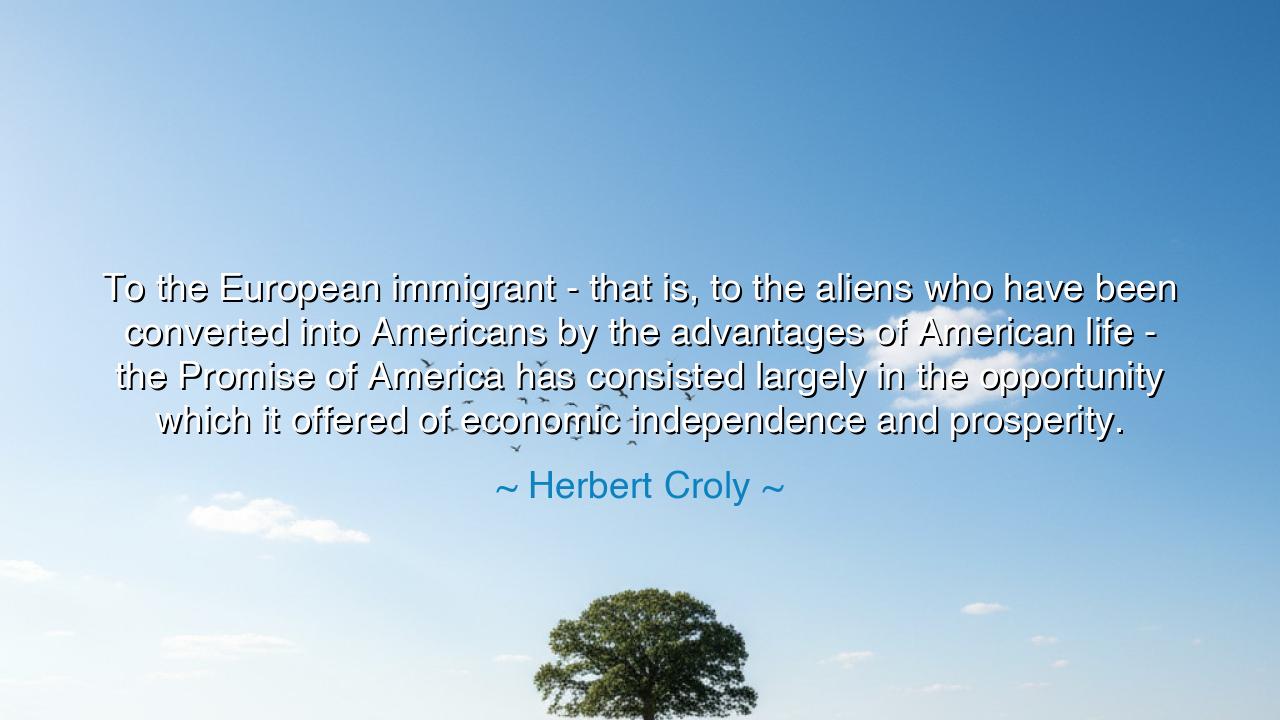
To the European immigrant - that is, to the aliens who have been
To the European immigrant - that is, to the aliens who have been converted into Americans by the advantages of American life - the Promise of America has consisted largely in the opportunity which it offered of economic independence and prosperity.






“To the European immigrant—that is, to the aliens who have been converted into Americans by the advantages of American life—the Promise of America has consisted largely in the opportunity which it offered of economic independence and prosperity.” Thus spoke Herbert Croly, philosopher of democracy and prophet of the American spirit, whose vision sought to reconcile the dream of liberty with the demands of progress. In this reflection, Croly captures not only the hopes of those who crossed the ocean to a new world, but the essence of what America once meant—and must mean still: the chance to build a life not through privilege, but through opportunity, not through inheritance, but through work. His words remind us that the Promise of America was not simply wealth, but the dignity of independence, the chance to stand upright in a land that measured a person not by birth, but by effort and resolve.
The origin of this quote lies in Croly’s great work, The Promise of American Life (1909), written in an age of transformation and turmoil. America had become a nation of factories, railroads, and cities; millions of European immigrants—Irish, Italian, German, Polish, and beyond—had arrived on its shores, seeking the redemption of a better life. To them, Croly wrote not as a critic but as a sage, trying to define the moral soul of this vast experiment. He saw how these new Americans, once strangers, found in labor and enterprise a new identity. The “advantages of American life”, as he described them, were not merely material—they were spiritual. For in this land, the immigrant was no longer a subject of kings or a tenant of lords. He could own land, craft a trade, educate his children, and live by his own strength. Economic independence, then, was not just survival—it was transformation, a sacred rebirth into freedom.
Yet Croly’s words also carry the weight of warning. The Promise of America, he observed, was rooted in ideals that could fade if not tended. As wealth concentrated in few hands and industrial might eclipsed moral duty, the nation risked betraying its founding covenant. The immigrant, who came in hope of independence, often found himself instead bound to factory floors, his labor consumed by the very systems that promised him liberty. Croly, a thinker of both compassion and realism, called for balance—a renewal of the social contract that would preserve both individual independence and the common good. He believed that the true destiny of America was not in riches alone, but in a shared prosperity where every person could rise without trampling another.
To understand Croly’s vision, one must remember the faces of those who lived his truth. Consider the story of Andrew Carnegie, the Scottish immigrant who arrived in America with nothing but will and faith, and who rose to build one of the greatest industrial empires of his age. His journey embodied the Promise of America—that through hard work and imagination, even the poor could achieve greatness. Yet even Carnegie, in his later years, recognized the double edge of prosperity. He gave away his fortune to build libraries and schools, saying that wealth must serve the public good. In him, we see the fulfillment of Croly’s wisdom: that economic independence is not an end, but a means to dignity, learning, and service.
Croly’s phrase, “converted into Americans by the advantages of American life,” speaks of more than assimilation—it speaks of transformation. The immigrant did not lose himself in America; he became more fully human because of it. For the first time, he could choose his destiny, speak his mind, and pursue the fruits of his own labor. But with that freedom came responsibility—the duty to uphold the very ideals that made such a transformation possible. America, in Croly’s view, was not a resting place, but a living covenant—a promise renewed by each generation that dared to believe in the power of effort, integrity, and equality.
The Promise of America, then, is not a gift handed down, but a fire kindled anew in every heart that seeks to live honestly and build something enduring. It is the belief that independence—both personal and economic—is not reserved for the few, but attainable by all who work and dream. Yet Croly’s insight teaches us that this promise must be protected from corruption. When wealth becomes worship, when opportunity narrows to privilege, the dream withers. The soul of a nation, like that of a person, must balance freedom with fairness, ambition with empathy.
Let this, then, be the lesson carried forward: that the independence Croly spoke of is not merely the freedom to succeed, but the freedom to serve—each life adding strength to the fabric of the nation. To the descendants of those European immigrants, and to all who come seeking new beginnings, the same charge remains: preserve the Promise of America not only in prosperity, but in principle. Let every worker remember that his labor builds more than wealth—it builds legacy. Let every citizen remember that liberty demands both courage and compassion.
For as Herbert Croly teaches, the Promise of America is not fulfilled by comfort, but by conviction. It is the vow that no matter one’s origin, one may rise through merit, and that in rising, one must lift others as well. So guard this promise, O children of freedom, for it is both inheritance and duty. And as long as the spirit of economic independence burns in the hearts of the people, America shall remain not just a nation—but an ideal, shining ever onward like a star for those who seek the light of hope across every sea.






AAdministratorAdministrator
Welcome, honored guests. Please leave a comment, we will respond soon